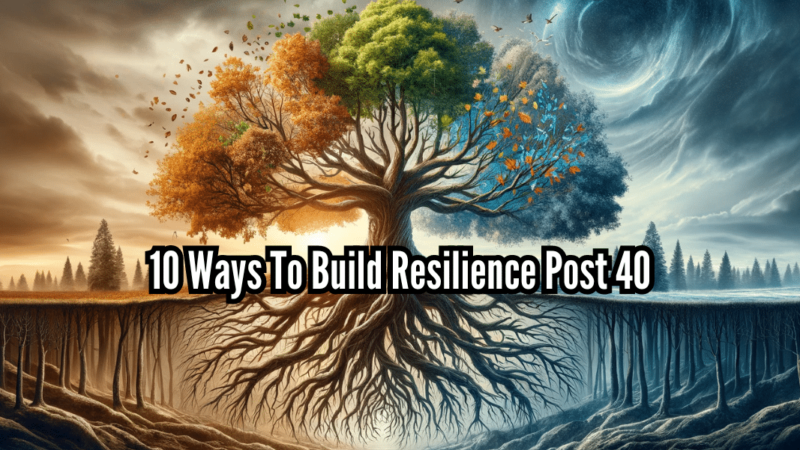10 Powerful Ways to Build Resilience Post-40
Life in your 40s comes with its own set of ups and downs. It’s a time when building resilience post-40 – the skill to bounce back from tough times – becomes more critical than ever. One study even found that resilience in midlife may protect against adverse health outcomes in later life. Now, who wouldn’t want that?
In our previous post, we touched on how resilience isn’t something you’re born with; it’s something you can develop by changing how you think, what you do, and the habits you form.
But more importantly, building resilience means taking action, making strong connections, and keeping a positive outlook. It’s about turning these actions into daily habits, even when life gets tough.
Still trying to figure out how to do this? Here are ten practical strategies that can help you weather life’s challenges, making you stronger and more adaptable.
Key Takeaways
- Cultivate resilience by being proactive, prioritizing self-care, and adopting a growth mindset.
- Nurture supportive relationships and focus on the present for a stronger foundation.
- Practice flexibility, gratitude, and embracing challenges to build resilience in everyday life.
Resilience is a crucial life skill for facing the ups and downs we all encounter. It’s not about never falling; it’s about getting back up and moving forward. To build your resilience, try these ten steps:
- Take Charge: Face problems directly and focus on solutions.
- Value Your Downtime: Rest well to stay mentally sharp.
- See Challenges as Opportunities: Learn from tough times.
- Build Strong Connections: Rely on friends and family for support.
- Live in the Now: Focus on the present, not past regrets or future worries.
- Accept Life’s Challenges: Understand that life is sometimes unfair.
- Stay Flexible: Be ready to change your methods when needed.
- Control What You Can: Focus on what’s in your hands.
- Be Thankful: Practice gratitude to maintain a positive outlook.
- Challenge Yourself: Take on tasks that test your resilience.
These steps will help you handle life’s challenges more effectively and grow stronger through them. Let’s uncover the resilience recipe of each in turn:
1. Take Charge

It’s essential to take charge when life throws challenges your way. Don’t just let them pile up. Instead, step up and tackle them directly. Think about what actions you can take immediately to lessen the impact or solve the problem.
Here’s how to be proactive in different areas of your life:
- Work-Life Balance: Make sure to rest and relax. You need this energy to act when required.
- Stay Present: Focus on the here and now. That’s what you can control.
- Embrace Flexibility: Be open to changing your plans. Different challenges might need new approaches.
- Focus on What You Can Change: Work on things within your control, and try not to stress over what you can’t change.
- Practice Gratitude: Concentrate on the positives in your life. It helps build resilience.
- Seek Challenges: Step out of your comfort zone. It’s a great way to strengthen your resilience.
By adopting these habits, you’re gearing up to handle life’s curveballs more effectively.
2. Value Your Downtime

Taking time for yourself is an essential strategy for building resilience. When you’re tired, facing life’s challenges gets tougher. To boost your resilience, having some “me time” every day is important.
During this time, you can reflect, meditate, or relax. Guarding this personal time strengthens your mind and body, helping you deal with challenges better.
Here’s how to make the most of your downtime:
- Set Boundaries: Keep work separate from personal time.
- Self-Care: Do things that refresh you, like exercise or reading.
- Unplug: Step away from screens for a real break.
- Mindfulness: Stay present and let go of stress.
- Build Relationships: Spending time with loved ones can also boost your resilience.
By valuing this downtime, you’re mentally and physically preparing for whatever comes next.
3. See Challenges As Opportunities

Life throws challenges at everyone. Building resilience means changing how you think and act. Try to see challenges not just as hurdles but as a chance to learn something new or improve a skill.
For instance, if you’re struggling with new software at work, view it as a chance to enhance your tech skills instead of getting frustrated. Or, if you’re going through a difficult time in a personal relationship, use it as an opportunity to develop better communication and understanding.
This approach not only helps you overcome the immediate challenge but also equips you with valuable experiences for the future.
4. Build Strong Connections

It’s tough to handle life’s challenges all by yourself, so having a group of friends and family to support you can make a huge difference in how you handle what life throws at you.
How to build valuable connections:
- Talk to People Around You: Start conversations with colleagues or neighbors. Join local events or groups to meet people who share your interests.
- Listen and Engage: When someone is talking to you, really listen. Show you’re interested in their life and feelings. Ask questions!
- Keep Up with Friends and Family: Regularly plan to spend time with people you care about. It could be as simple as a phone call or meeting for coffee.
- Be Open About Your Feelings: It’s okay to talk about your emotions with people you trust. This honesty and vulnerability can make your relationships stronger.
- Help Out: If your friends or family are struggling, be there to support them. This can strengthen your bonds, making you both more resilient.
- Celebrate Good Times: When someone you know achieves something, be happy with them and celebrate their success.
These actions can help you build a strong support network, making it easier to bounce back from challenges.
5. Live in the Now

Research has identified that focusing on the present is a core strategy to help you become more resilient. Here are ways to do it:
- Focus Your Energy Now: If you start thinking about past mistakes or worrying about the future, stop and think about the present instead. Worrying about things you can’t change just adds stress.
- Adapt to Situations: Being resilient means being able to change your plans. If something unexpected happens, think of new ways to reach your goals.
- Work on What You Can Change: Focus on things in your life that you can do something about. Believe in your power to make changes.
These small changes in thinking and acting can help build your resilience. You’ll be better at handling life’s challenges.
6. Accept Life’s Challenges

Everyone faces tough times, and it’s normal to feel that life can be unfair. The important thing is to understand this and not let it overwhelm you. Focus on what you can control rather than getting stuck on the unfairness.
This doesn’t mean you ignore life’s difficulties; it means you recognize them but choose to concentrate on your actions and responses.
Doing this gives you the strength to handle life’s ups and downs more effectively.
7. Stay Flexible

Life often doesn’t go as planned. When you face challenges, it’s important to be ready to change your plans. If you hit a roadblock, consider different ways to reach your goals. Don’t give up on your dreams just because you have to take a different path. Being creative and open to new ideas can help you overcome these obstacles. Flexibility lets you move forward, even when things get tough. Remember, adapting is vital in building resilience and dealing with life’s challenges.
8. Focus on What You Can Control

When facing life’s challenges, it’s crucial to concentrate on the aspects you can influence. Resilient people understand they possess the power to change their own lives rather than blaming their environment or circumstances. Defeated attitudes won’t help tackle obstacles; only those who embrace the challenge experience growth.
Make a conscious effort to remove any defeatist mindset and recognize your capacity to make a difference. Concentrate on altering what is possible in situations, and let go of the things you have no control over. By practicing this, you’ll build resilience and foster greater confidence in your ability to overcome life’s inevitable hurdles. Remember, your role is to be proactive, agile, and adaptable in the face of adversity. You’ve got this!
9. Be Thankful

Practicing gratitude is a crucial tool in fostering resilience. When we allow negativity to take over, our resilience weakens. Make it a habit to focus on the positive aspects of your life. Although our brains are wired to concentrate on negative events to protect us from harm, try to divert your attention to the good things when you know you’re not in immediate danger.
To cultivate gratitude, consider writing down three things you’re thankful for daily. As you accomplish this daily task, you’ll be amazed by the numerous reasons you have to be happy. Your mindset will likely become more positive, and this will contribute to your ability to be resilient.
By consciously practicing gratitude, you empower yourself to handle the challenges that life throws your way and to bounce back with grace and strength.
10. Challenge Yourself

Life in your 40s is full of ups and downs, and facing challenges is something we all have to do. It’s important to develop resilience, a skill that helps you bounce back and keep moving forward despite the obstacles you encounter.
By practicing these tips, you can strengthen your resilience and be better equipped to tackle whatever midlife throws your way. Resilience is a skill that develops over time, so don’t be discouraged if it takes some practice. Keep working on it, and you’ll become more resilient, tackling life’s obstacles with greater ease and confidence.


